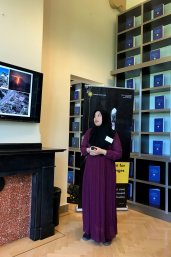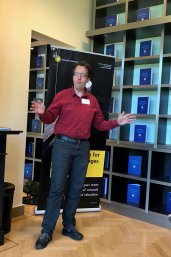INHaLE kick-off at panel session LANDac Annual International Conference
The INHaLE initiative had its first open kick-off session during the LANDac Annual International Conference, which took place on 28-29 June in the iconic building of The Munt.
During a devoted 3-hour panel session, five participants of the INHaLE initiative presented current work on the intersecting themes of natural disasters, risk management, governance, and economics to an active and helpful audience of conference participants and INHaLE members. The five presentations were followed up by an excellent discussion of prof Zbyszek Kundzewicz, professor of Earth Sciences and head of Laboratory of Climate and Water Resources in the Institute for Agricultural and Forest Environment in Poznán. Among many academic achievements, he was heavily involved in the IPCC reports on climate change. Prof Kundzewicz reflected on the presented research projects of INHaLE members, and gave very useful advise as to how to further strengthen and sharpen the research goals and approaches, given the expertise and experience of the INHaLE members. The session provided substantial input to the INHaLE team and further sharpened its vision on where the initiative can take its research agenda.
Nocturnal light
The first half of the session started with a presentation by Vincent Schippers, PhD Candidate at the Utrecht University School of Economics (U.S.E.), on studying local economic impacts of natural disasters by using nocturnal light captured by satellites. By tracking changes in night light intensity following the occurrence of natural disasters, he and his colleagues show that we can track direct impacts and short-term impact of natural disasters on economic activity.
His talk was followed by Fujin Zhou, assistant professor at the Institute for Environmental Studies (IVM) at VU Amsterdam, who studies the impact of natural disasters on firms in Vietnam, together with prof Wouter Botzen, professor at U.S.E. and at IVM. Zhou and Botzen find that storm and flood events tend to positively affect the growth in output and employment, suggesting that disasters may have positive business effects. After studying disaster impact at high geographical resolutions, the discussion moved to the country level, where Runliang Li, PhD Candidate at the Finance department of Maastricht University, presented econometric work on how countries’ institutions shape their ability to minimize fatalities and damages from natural disasters. In all presentations, the group collected valuable feedback from the conference audience, while making new contacts with researchers in related fields.

Impact on Tourism
After an appetizing lunch, the second half of the session started with Erda Rindrasih, PhD Candidate at International Development Studies at Human Geography and Planning of the UU, presenting work on how natural disasters impact the tourism sector of Indonesia. She showed that disasters substantially reduce inflow of tourists, and may lead to tourists looking for different destinations in other regions of the country.

Finally, Dries Hegger, Assistant Professor at the Copernicus Institute for Sustainable Development, presented a review of the potential role of residents in flood risk governance, showing that there is substantial room for improvement in the governance process, by acknowledging additional roles for residents as consumers in the market and as civil society members. The session was then concluded by prof Kundzewicz, who reflected on the presentations and gave an outsider’s view on the INHaLE initiative as a group, and on the research questions and directions it could take. In agreement with the present members and the conference audience, a strong line was identified in the link between studying disaster impacts and the institutional structure and processes underlying the governance of these risks.
The kick-off session was a very fruitful and successful session, in which the INHaLE group had the opportunity to get to know each other’s work more in-depth, while also streamlining thoughts about future collaboration in research projects. The present members enjoyed the day very much, and once more thank the LANDac conference organization for hosting this wonderful afternoon and the Centre for Global Challenges for kindly sponsoring the INHaLE project.

